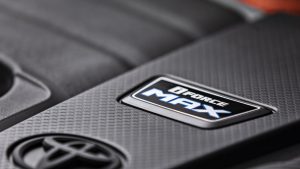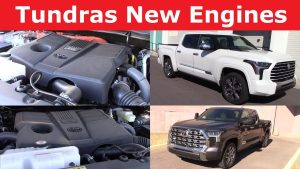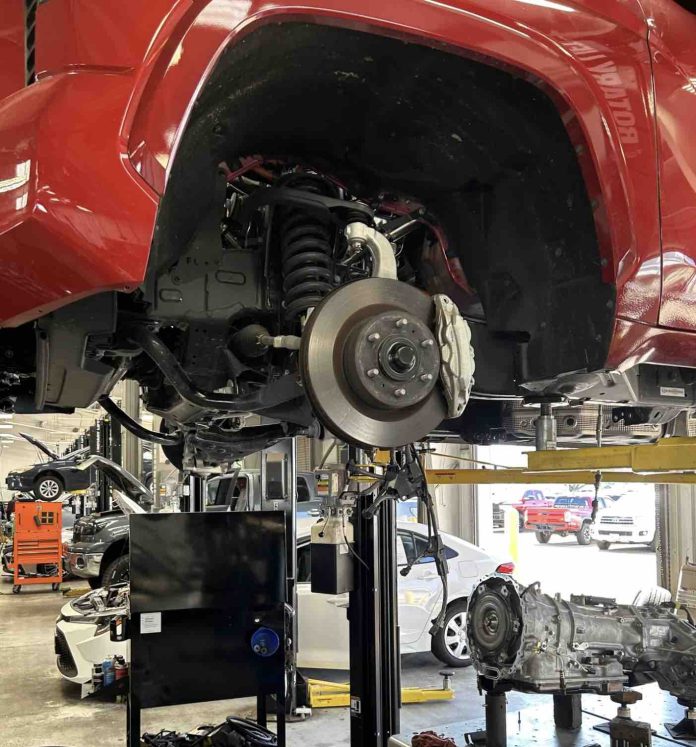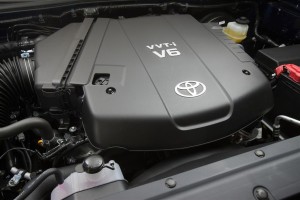Something big is wrong when brand-new Toyotas are developing big problems all-of-a-sudden.
In italics to emphasize the all-of-a-sudden. And Toyota.
Times twice now, it looks like.
The first problem cropped up shortly after the redesigned Tundra pick-up came out in 2022. More finely, after the V8 engine that had previously been standard in the Tundra was retired in favor of a compliance engine. Toyota didn’t call its new twin-turbo V6 engine that, of course.
But that doesn’t mean it isn’t.
The V8 was not retired because it was a bad engine; far from it. It is known to be among the best engines Toyota or any other manufacturer ever manufactured, if by “best” is meant extremely reliable and long-lived. Powerful, too. It was an ideal truck engine for all of those reasons. And that gave truck buyers a reason to buy – and trust – Toyota trucks.
But the V8’s gas mileage wasn’t good enough – for the government bureaucrats who have by some strange turn of events become the people who get to decide how much gas the vehicle you buy may use, irrespective of your own cost-benefit considerations. These apparatchiks insist that trucks use no more gas than a mid-sized car (on the way to an economy car). And if that’s not enough of a prod, then there is the matter of the gas that can only be reduced by burning less gas.
This pincer movement has forced Toyota – and every other manufacturer of mass-market vehicles – to take their star quarterback off the field (so to speak) and in his place, what amounts to some guy they hope will be able to do the job as well.
Cue the results.
Toyota has had to recall more than 100,000 Tundra trucks (and Lexus LX600s, which use the same new engine) in order to replace the engine that replaced the anvil-reliable 5.7 liter V8 engine. The new engine that has proved to be unreliable is a much smaller engine, with two fewer cylinders and a pair of turbos to make up for that. More finely, in order to burn (and “emit”) less gas.
Even more finely, to comply.
This has cost Toyota dearly – in terms of the confidence buyers once had in the reliability of Toyota vehicles.
And now comes more of the same.
Apparently, the also-just-redesigned Tacoma pick-up, which also has a new compliance engine (a small turbo four in place of the anvil-reliable V6 sans turbo it used to offer) is having problems with its transmissions.
Both of them.
The available manual and the automatic. A number of people who bought the new Tacoma – with the new compliance engine – have reported transmission failures, some after less than 1,000 miles of driving. These have – ironically – been reported to the federal apparat, which is kind of like complaining to the Godfather about Luca Brasi.
It is unclear whether these problem are the result of design or manufacturing defects. But we know the cause of these problems.
Compliance.
Toyota – like every other vehicle manufacturer that is trying to remain in the business of manufacturing vehicles – has been effectively forced to retire proven engines (and transmissions) in order to comply with the latest (and pending) regs, in favor of what will likely prove to be rushed-into-production compliance engines that are proving to be . . . problem engines.
The why for that may have something to do with the compliance engine in the new Tacoma, which is (like the Tundra and Lexus LX600’s new engine) a heavily turbo-boosted engine. Also – in top-trim – hybridized, producing a total of 465 ft.-lbs. of torque, which is 200 ft.-lbs. more torque than was produced by the anvil-reliable 3.5 liter V6 sans turbo that’s been retired. All that torque is also made almost immediately – at just 1,700 RPM. That is a lot of torque for any transmission to handle.
Especially if it’s one that was designed to handle 265 ft.-lbs. of torque – the amount produced by the uncompliant but anvil-reliable 3.5 liter V6 you used to be able to get in the Tacoma, paired with a six speed manual transmission that is probably the same six speed manual bolted to the new turbo-hybrid compliance engine that was not designed to handle another 200 ft.-lbs. of torque.
Or if it’s a brand-new eight speed automatic that’s not been fully vetted.
That one being the new Taco’s new eight speed automatic, which is a compliance transmission with two more gears than the previously used (and anvil reliable) six speed automatic transmission.
You see the multiple potential (and now, actual) failure points. A new compliance engine that Toyota made more powerful – via turbo-hybridizing it – to try to get Taco buyers to forget the anvil-reliable V6 that used to be the Taco’s optional engine – and the base four without a turbo that used to be the Taco’s standard engine. Add a new-design transmission – and put the old (manual) transmission behind the new compliance engine.
Do it all in a hurry, too.
Behold the results.
Brand equity established over decades of producing anvil-reliable drivetrains is being pissed away in a matter of less than six months as word percolates that Toyota’s new roster of compliance engines are not anvil-reliable engines. And now they’re having transmission problems on top of that.
It is well and good that Toyota is replacing the problem engines (and transmissions) but how do you replace trust once lost? Will the people who own these problem-plagued vehicles feel confident driving them? Will Toyota compensate them for the loss of resale value sure to come along for the ride?
Who will compensate Toyota for the loss of brand equity?
It’s an ugly business, especially because few outside the business understand who the real killer – per OJ – is. That would be the regulatory apparat that by some strange happenstance has become the intercessor between buyer and seller. Toyota can’t sell people the anvil-reliable V8 that used to inspire confidence in Tundra buyers. Nor the anvil-reliable non-turbo-hybrid V6 (and non-turbo four) that used to engender justified confidence in the Taco.
It’s all being pissed away – for the sake of compliance.
. . .
If you like what you’ve found here please consider supporting EPautos.
We depend on you to keep the wheels turning!
Our donate button is here.
If you prefer not to use PayPal, our mailing address is:
EPautos
721 Hummingbird Lane SE
Copper Hill, VA 24079
PS: Get an EPautos magnet or sticker or coaster in return for a $20 or more one-time donation or a $10 or more monthly recurring donation. (Please be sure to tell us you want a magnet or sticker or coaster – and also, provide an address, so we know where to mail the thing!)
If you like items like the Baaaaaa! baseball cap pictured below, you can find that and more at the EPautos store!













What exactly is the issue with the Taco’s MT? I feel the Aftermarket can fix it better than Toyota could, provided its something like a clutch or clutch line
The problem with these failing so quickly is the replacement parts are unlikely to have been upgraded to something more reliable yet. If the parts are even available. They aren’t going to ‘fix’ the problem in a week, or a month. You have to look at failure patterns, figure out a fix, test it, have the new parts manufactured, etc etc etc. Also the dealerships don’t have unlimited techs sitting around waiting to do major repairs that can sometimes take days.
It took Honda damn near a decade to provide a fix for the V6’s that like to spin the rod bearings. Honda is also a company that used to have damn near bulletproof engines, not so much anymore with the compliance engines. Malaise Era 2.0.
A lot of companies, such as Mercedes just pay the fines and add them to the cost of the car. Toyota should’ve done that instead of going woke.
I can’t help but ask a hopelessly obvious question: why didn’t Toyota start R&D work on these engines and transmissions sooner? I mean, these regs weren’t announced yesterday; they were promulgated years ago, so Toyota, along with other automakers, knew what was coming and when. Secondly, Toyota has participated in racing before, so they also know how to do R&D quickly, and to do so in conformity with the racing series’ regs.
Or better yet, why don’t automakers just say NO to such ludicrous regs in the first place? After all, they got plenty of money to afford decent lawyers.
Hi Bluegrey,
It seems to be true that there’s always a lag between the assertion of tyranny and resistance to it. “Masking” is a case in point. Most people just put up with it at first – and for a considerable time. But as time passed, the effrontery of it became more and more insufferable – and more and more refused to go along with it. I expect that the same will happen as regards cars. I think it’s already beginning to happen, in fact – on the car buying end. More and more people aren’t. When a sufficiency stop buying, the industry will have to respond or go out of business. It’s coming.
Especially since, with car regs, there was a very real need at one time, particularly on the air pollution front. I remember when flying into LA back in the 1980s seeing the SMOG; that was thick! There was little or no resistance early on because there was a very real problem with air pollution.
Then, as time went on, automakers helped the EPA draft the regs! One was for public relations purposes; they could virtue signal and show how much they cared. The second reason was to impose further barriers to entry for new competitors. Unfortunately, when one gets in bed with the Devil, one pays for it sooner or later.
The pollution in the Los Angeles basin that you mention was not caused by cars.
The indigenous people (native American Indians) named the Los Angeles basin the “valley of smoke” due to the air inversions taking place because of the topography.
Nestled between mountains and the ocean, air inversions that trapped any pollutants were not only common, but an ordinary part of life in that region.
California was permitted to establish its own pollution standards, much stricter than the rest of the states just because of the relative unique topography of the area.
Nowadays, all 50 states are paying for pollution problems that exist pretty much only in California.
LA wasn’t the only city with bad air pollution, BTW. London, in Merry Old England, was notoriously bad too, yet its topography is totally different than that of LA. I remember how, when riding my bike in Jersey, the fumes from cars were overpowering during the summer; they were bad. Air pollution was a thing.
What “regular people” don’t seem to comprehend or even understand about all these treasonous actions by political apparatchiks regarding laws demanding less fuel use, better MPG, higher CAFE, etc, is that these actions are all by “design” and follow an agenda. The (((2030))) agenda? To force sooner elimination of ICE vehicles, move to more expensive electric vehicles, which are unaffordable for the masses, and eliminate people, period!!! Please realize that all government is bad, and all politicians are worse!!! Good luck y’all and plan for the worst, cuz that’s heading our way for sure….
I agree, but that’s a separate debate. The fact of the matter is that it’s been decades since the automakers gave any meaningful resistance to these regs. Shoot, they often help to WRITE THEM!
We’re from the government and we are here to tell you how to do it.
If you don’t do as we say, we’ll fine you millions.
If you can’t do it right, too bad, better luck next time.
A hundred thousand engines at five grand each is 500 million dollars. A hundred thousand transmissions at three grand each will be 300 million dollars.
Say sayonara to 800,000,000 USD.
Seppuku for 100,000 Toyota engines and transmissions.
From zero mph to zero mph in nothing flat.
It’s dead, Jim.
I find it interesting that Mazda went into reverse on the CX-5 by no longer having Awful Start/Stop or cylinder deactivation on the excellent Skyactive engine. I’d buy one, except they still have the other awful crap like lane keep/departure, automatic brakes, radar cruise, etc. and no way to PERMANENTLY disable any of it.
Kinda OT but… I was over at a “news” website and an ad popped up for a “new” 70s era pickup truck from some small batch auto rest-redo company. Starting at $369,900. Bespoke custom coaches. It’s happening too.
I have a 2010 Tundra with the iForce 350 (5.7 liter) and it is a wonderful truck with a great engine that sounds damned fine when you get on it. My son’s Sequoia has the 4.6 liter V-8. Both have more than 100k miles (my son’s has 250k) and run like tops.
These new engines likely won’t reach those milestones and are grenading Toyota’s hard-earned reputation for reliability.
I love this country, but I ABSOLUTELY LOATHE our government. These know-it-all, true believer Gaia-worshipping, overpaid, underworked useless drags on the oxygen supply who are regulating our auto industry out of business need to go to hell.
If there still are any Toyota engineers with any integrity, they must be crying themselves to sleep every night over what they’ve been forced to try to build.
It’s an engineering maxim. The more complex the system, the more likely it is to fail.
The state is requiring them to build ever more complex and expensive systems, quickly.
Off topic, but important to web sites like this one:
‘A U.S. judge ruled on Monday that Google violated antitrust law, spending billions of dollars to create an illegal monopoly and become the world’s default search engine. The ruling paves the way for a second trial to determine potential fixes, possibly including a breakup of Google parent Alphabet.
“The court reaches the following conclusion: Google is a monopolist, and it has acted as one to maintain its monopoly,” U.S. District Judge Amit Mehta, Washington, D.C., wrote. Google controls about 90% of the online search market and 95% on smartphones.
‘Mehta noted that Google had paid $26.3 billion in 2021 alone to ensure that its search engine is the default on smartphones and browsers, and to keep its dominant market share.
‘In the past four years, federal antitrust regulators have also sued Meta Platforms, Amazon.com and Apple, claiming the companies have illegally maintained monopolies. Those cases all began under the administration of former President Donald Trump.’
https://finance.yahoo.com/news/u-judge-rules-google-broke-185454039.html
Busting evil Google to pieces — at a minimum, making search, online ads and YouTube separate businesses — would be a massive win for the people.
The problem is that it takes a long time to bust a big monopoly like that. Remember Rockefeller’s Standard Oil? It took over a CENTURY to fully untangle that monster! And, even when it’s untangled, they can resort to legal trickery like interlocking boards and all that.
It’s making more and more sense to buy gently used these days…
YEP! That’s why I’m in the process of trying to buy a gently used, 2006 Nissan Altima 2.5S; it’s like the one I used to have, but it’s silver metallic, my favorite car color. The 3rd Gen Altimas are good, solid cars that have enough tech, but not too much.
Failure of a manual transmission is a shocker. One article mentions metal shavings in the fluid. That would do it.
It also mentions ‘a six-speed intelligent manual transmission (iMT) with automatic rev-matching, clutch-start cancel, and anti-stall technology.’
Uh oh. The ‘iMT’ designation, aping Apple’s iPhone terminology (probably to a degree that Apple can sue, if it hasn’t licensed that lower-case ‘i’), already is a turn-off. Ain’t never been a shift lever on a damned smart phone, although it might make a nice accessory for female owners (bzzzzzz).
Then there’s ‘automatic rev-matching, clutch-start cancel, and anti-stall technology.’ All interesting stuff — IF their added complexity does not compromise the anvil-reliable nature of a manual transmission. But it’s really hard — hell, probably impossible — to add such features without substantially increasing the number of failure modes.
First and foremost, it sounds like Toyota has some combination of a parts problem and a manufacturing procedures problem at particular plant(s). Oh well, there are still plenty of great Toyota trucks out there from 10 to 50 years old, before everything turned to shit.
Give me a Hilux and bed-mounted .50 caliber, and I’ll straighten this mess out in a jiffy, y’all.
The 6M Taco only in the ’24-up has 310 ft/lb of torque.
Not a huge jump from the prior V6, but still very strange that they are failing, particularly since that transmission is an in-house, Toyota built unit and had essentially ZERO known/common problems in the 2nd and 3rd gen Tacos.
Pour another one out for the forgotten 4.6V8 that was once available in the Tundra.
My old man has one in an ’11.
Not as powerful as the 5.7, but will get you 20mpg all day and is useful for just about any task unless you need to pull a 10,000 trailer.
One wonders what might be for sale in the US had the moderate wing of the CCP (as personified by Jiang Zemin) remained in power, instead of the infighting that led to Xi Jinping and his retrenchment from Beijing.
It’s almost as if the automakers were planning on becoming importer/exporters, selling the low end Chinese vehicles to meet government edicts (don’t kid yourself, they had every bit as much to do with writing the regulations as the greens and bureaucrats), while turning the US products into boutique coach-works, much like the Corvette plant in Indiana. Cheap Chinese cars that sell for nearly nothing for the masses, maybe military/fleet vehicles and prestige badges in the US. Now they’re left scrambling to develop their own “China, with western pay scales” factories that will somehow compete.
People have a difficult time wrapping their heads around just how much cheaper it is to manufacture in China than in the US. And it isn’t just labor, the whole country is set up for exports, has very lax environmental laws, and it’s dead simple to get something like a circuit board built in a few days, just upload a Gerber file and pay. That’s for anyone, not just Apple. Companies like PCB Way will even help with layout and substitutions that will save money because they have the components on the tape reel already. Just the sort of environment you need if you want to sell cheap, compliant cars in the first world.
Some say that “Trump’s” tariffs triggered the change, but I imagine the Obama and Bush administrations were happy to look the other way, until even the most blind optimist couldn’t ignore what was happening. I imagine the DC elites were happy to look the other way because it made gadgets and consumer goods cheap enough to mask what should have been massive inflation after the Greenspan Y2K Shenanigans, the War On Terror™ and Obamacare for banks.
Not to mention the knock-on effects of putting cheap computing power into everything. There’s a cute little girl who (along with her husband) run a big mega corn farm out in Nebraska. She posts videos of her working up on the social nets. The far equipment is nearly all automated, with GPS driven tractors, sensors all over the equipment to make sure everything works perfectly, and basically she can sit in the cab and monitor the lights… doesn’t even break a sweat. Back in the day there might have been two or more people running the harvester. I did some hay bailing back in the day, with my college roommate and his family. It took 4 of us to keep the bailer fed, the bails moving and the 50’s era tractor didn’t do much to help out with the brainwork. I’ll bet that that could all be done with one person running a tractor. Even with the John Deere tax, I’m sure the farmers come out ahead.
If Mexico would get past the Treaty of Guadalupe Hidalgo they could easily be the next China. I read somewhere that Mexico has the least number of English speakers in the western hemisphere, no doubt because they’re still sore over losing California and Las Vegas to the Gringos. Oh, sure there’s lots of business that goes through Tijuana and Mexicali, but not at the scale of China and the rest of Asia. And now they’re making deals with the CCP.
That corn farm sounds like a big ethanol business. AFA the CCP teaming up with Mexico, there are thousands of Chinese in Mexico making fentanyl from CCP precursors per Peter Schweizer. Part of China’s war on the US.
Yep. Cattle feed and ethanol. And shilling for big ag companies like Deere John.
https://www.youtube.com/channel/UCA1y-4TJdVEcSMWN9OZfGSA
People have a difficult time wrapping their heads around just how much cheaper it is to manufacture in China than in the US.
Well, it’s cheaper for a reason, and in the auto industry, that very reason could lead to recalls, which may very well wipe out the initial cost savings. Cheap is dear.
Hard saying. I have very few hardware issues with my Chinese built Apple iDevices. And Chinese drones are the best in the business. When it’s a halo industry Chinese factories can push out very good product.
But you still get what you pay for, even at “best price.” If the western buyer isn’t vigilant they’re going to get cut corners. Or worse, the case of what happened to the Italian manufacturers, knock-offs going out the back door after hours. Hard to blame Gucci if they have a flood of knock-off handbags coming out of the same factory, they’re the ones who got in bed with people who ignore intellectual property rights.
“don’t kid yourself, they had every bit as much to do with writing the regulations as the greens and bureaucrats”
This is what I keep going back to! This is not something happening to automakers out of the blue. This is their “morning after hangover” after smoking too much paid-for-government.
We have know for years, as an absolute fact, that our Congress does NOT write laws. Laws are handed to them by the entities that have bought them out. “We have to pass it to see what it says” (etc.)
They don’t know and apparently don’t care WTF the bills handed to them will do to people as long as they are filthy rich. Fuck the cattle! Let them eat bugs and drive EVs! Congress will make sure they’re exempt from all the bullshit.
You can’t tell me that, unlike Big Pharma or Big Ag, etc., etc., that automakers couldn’t have greased these gears in a direction that they favor. Bullshit. Yes, they could.
This is what they did to themselves and, more importantly, to us. Fuck them. Fuck Toyota. Fuck ’em all. They all deserve every second of misery that they signed us all up for.
The ones leading the automakers, making these decisions, are in the club, and will continue to enrich themselves. The casualties of their decisions will be the lower employees and customers, as they always are, as intended, by design. They really got this system down to a pat.
I remember in the olden times (when I still had hair) that the Japanese would inflict their latest designs on the home market for a couple years so that when it hit our shores it had been totally debugged and worked great (unlike the big three/ Mugged by Mister Badwrench type situations).
It looks like that doesn’t happen anymore. So once again we go back to the never buy anything that’s newer than 2 or 3 year old designs. My guess the reason for the tranny failures is more power and fun to beat on it acceleration caused it. Turbo 400 and an adapter kit might work but you shouldn’t have to do that on a new truck.
After the USG destroys American manufacturing and it’s Jap/Euroweenie lapdogs’ manufacturing as well, the ChiComs will be ready to step in. You’ll be able to go to Harbor Freight and buy a BYD or Geely –even while the US is at war with Chyyyyna over Tawain and/or the Spratley Islands. Not a bright future for us…
I once had hair as well. Reminds me of the scene from Seinfeld where George is getting fitted for a toupee & the salesman goes off on Jerry.
Here: https://www.youtube.com/watch?v=kqbjRXJRax0
On my list of videos to watch. Thanks.
“There is no replacement for displacement” is proven true yet again.
Even Toyota can’t get the far more complex compliance engine right.